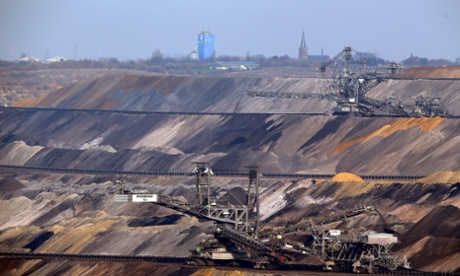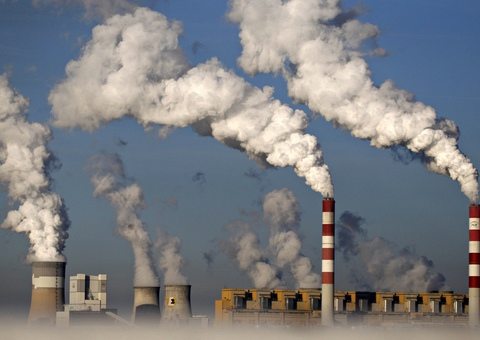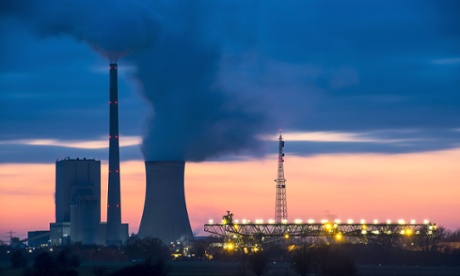New coal power stations designed to burn Europe’s massive deposits of lignite pose a serious threat to the continent’s decarbonisation efforts, according to figures released on Wednesday.
Analysts from Greenpeace’s Energydesk compiled data from the German government that shows burning Europe’s reserves of lignite would wipe out the EU’s entire carbon budget from 2020 until the end of the century.
Lignite – also known as brown coal – power stations currently make up more than 10% of the EU’s total CO2 emissions. Greenpeace said that if Europe is to continue to play its part in keeping the world within the internationally accepted limit of 2C of warming, 90% of the carbon contained in its lignite reserves must remain buried.
Despite this, lignite-fuelled power stations are still being built, locking in consumption of the fuel for decades. There are 19 such facilities in various stages of approval, planning or construction in Bulgaria, Czech Republic, Greece, Germany, Poland, Romania and Slovenia. Greenpeace figures show these new projects alone would emit almost 120m tonnes of CO2 every year – equivalent to three-quarters of the annual carbon output of the UK’s energy sector. The average lifespan for a coal power station is about 40 years, meaning the plants could release nearly 5bn tonnes of CO2 into the atmosphere.
Greenpeace energy analyst Jimmy Aldridge said: “The expansion of lignite mining in Europe is today the most serious symptom of the continent’s chronic addiction to dangerous fossil fuels, and a massive threat to its efforts to tackle climate change. The companies involved will continue for as long as they can – we need our political leaders to act in order to stop this situation from getting worse. [Barack] Obama has taken decisive action against coal in the US, it’s time European leaders did the same.”
But Max Grünig, an energy sector economist at the Ecologic Institute in Germany, said the continued burning of lignite did not represent an immediate threat to carbon targets.
“The total cap for the EU emissions trading scheme is decreasing and ensures that the energy sector is on track to meet the climate targets. If there are more coal power plants, they will have to compensate by buying emissions allowances from other sectors, but net emissions of CO2 cannot increase.”
Grünig said the strategic reliance on lignite in politically powerful Poland and Germany had made these countries resistant to more ambitious emissions targets. Poland was especially belligerent during the process of creating the 2030 emissions target of a 40% reduction by 2030.
“Poland is in the sad position to depend mostly (above 90%) on coal and has therefore very high costs associated with stricter emissions targets. Thus, they have to resist proposals for stricter targets in their own financial interest. It’s a trap,” he said.
On Saturday, 7,500 Greenpeace protesters created a human chain across the German-Polish border. The symbolic gesture linked two villages earmarked for destruction to make room for the planned expansion of an open cut lignite mine.
On the German side of the border in Lusatia, Sweden’s state energy company Vattenfall operates mines and power stations that emit as much CO2 as the whole of Sweden, according to Greenpeace figures. The company is looking to expand its mining operations at three of its existing sites. Greenpeace claims Vattenfall also has two entirely new mines in the planning process as well as a new power station. Vattenfall says there are no new mines being planned. But a spokesperson for Vattenfall said new power infrastructure was dependent on the approval of expanded mining operations.
“As long as the extension of Jänschwalde opencast mine will be agreed by the states government of Brandenburg, in a midterm there will be needed a newly built power plant in Jänschwalde.”
Lignite is an increasingly important part of the world’s energy supply. Consumption in Europe has remained stable since the late 1990s, but grew slightly over the past few years on the back of high gas prices and the scaling back of nuclear power in Germany. In Poland, lignite burning increased 3.7% in 2012, a year when power demand was actually falling. A recent analysis by Standard and Poor’s found that 50-60% of the world’s coal reserves were low-quality, high-emitting coals such as lignite.











